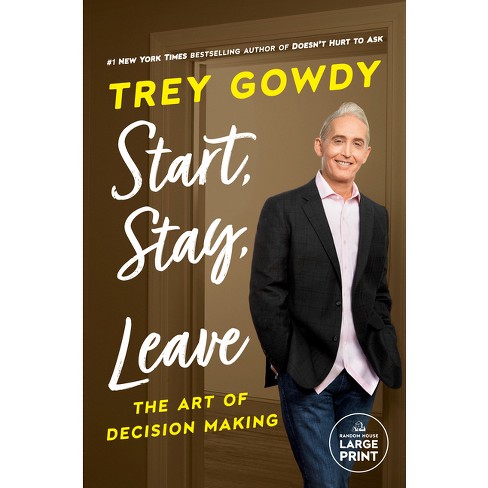“Start, Stay, or Leave: A Guide to Getting the Job You Want” by Trey Gowdy is a powerful guidebook for anyone looking to jumpstart their career or navigate the complexities of the modern job market. Through his extensive experience as a former federal prosecutor and four-term Congressman, Gowdy provides invaluable insights into the skills, values, and mindsets needed to succeed in any profession. His book is filled with practical advice, real-world examples, and actionable steps to help readers identify their goals and chart a path to success. Here are 5 lessons and 5 action steps you can take from the book.
Top 5 Lessons
Here are the top five lessons from the book:
Lesson #1: Define your purpose.
Without a clear sense of purpose and direction, it’s easy to feel lost and directionless in your career. Gowdy advises readers to take time to reflect on their passions, skills, and values to identify what truly motivates them and align their career goals accordingly.
Lesson #2: Master the basics.
To be successful in any job, it’s crucial to master the fundamental skills and knowledge required for your field. This includes developing strong writing and communication skills, staying up-to-date with the latest trends and innovations, and cultivating a strong work ethic.
Lesson #3: Build your network.
In today’s interconnected world, building and maintaining a strong professional network is essential for career growth and success. Gowdy provides practical advice on how to network effectively, build relationships with colleagues and industry experts, and leverage your network to advance your career.
Lesson #4: Take risks.
Gowdy emphasizes the importance of taking calculated risks to move forward in your career. This includes taking on new projects, seeking out leadership opportunities, and being willing to step outside your comfort zone to pursue new challenges and opportunities.
Lesson #5: Cultivate resilience.
No career path is without its setbacks and challenges. Gowdy encourages readers to develop resilience, perseverance, and a growth mindset to weather the inevitable ups and downs of the job market and navigate obstacles with confidence and optimism.
Top 5 Action Steps
Here are five action steps you can apply to get the job you want:
Action Step #1: Clarify your purpose.
Take some time to reflect on your goals and aspirations, and determine whether your current job aligns with them. If it doesn’t, identify what changes need to be made to bring them into alignment.
Action Step #2: Develop your skills.
Consider taking courses or attending seminars to enhance your skill set. Identify ways to leverage your current role to develop these skills. Look for ways to volunteer, take on additional responsibilities, or switch to a different position within your organization.
Action Step #3: Cultivate relationships.
Get to know your coworkers and understand their needs and concerns. Make networking a priority by attending industry events, participating in professional organizations, and connecting with others on social media.
Action Step #4: Seek feedback.
Seek out feedback from your manager, peers, and other stakeholders. Ask for specific feedback on your strengths and areas for improvement. Listen carefully and take action on their recommendations.
Action Step #5: Take action.
Develop a plan with specific milestones and deadlines, and hold yourself accountable for making progress towards your goals. Celebrate your successes along the way, and use setbacks as opportunities for growth and learning.
“Start, Stay, or Leave” is a must-read for anyone seeking to advance their career, whether you are just starting out or looking to make a change. By following Gowdy’s advice and taking action on the lessons and action steps outlined in the book, you can set yourself up for a fulfilling and rewarding career.
